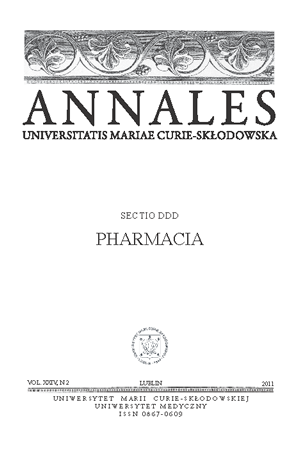Czy ACTH4-9 zapobiega zaburzeniom zachowań wywołanych deksametazonem stosowanym w wyższych dawkach?
Słowa kluczowe:
glikokortykosteroidy, deksametazon, ACTH4-9, testy zachowań, neurodegeneracja, neuroprotekcja, myszyAbstrakt
Glikokortykosteroidy (GCs), z powodu ich właściwości przeciwzapalnych i immunosupresyjnych, są stosowane w terapii alergii, chorób reumatologicznych, neurologicznych i z autoagresji. GCs i ich preparaty, takie jak: deksametazon (DEX), często stosowane przewlekle w wysokich dawkach, mogą wywoływać neuronalne uszkodzenia mózgu , szczególnie hipokampa, struktury bogatej w receptory dla GCs i odgrywającej ważną rolę w pamięci, nastroju i zachowaniach. Nasze i innych autorów badania wskazują na neuroprotekcyjne działanie ACTH4-9 -(-syntetyczny adrenokortikotropowy-4-9-analog) w ośrodkowych i obwodowych modelach neuronalnej degeneracji. Celem tego eksperymentu było zbadanie wpływu ACTH4-9 (w dawkach: 50 i 100 mg/kg stosowanych 2 razy w tygodniu) na zaburzone efekty zachowań myszy poddanych neurotoksycznemu działaniu DEX (w dawkach 40 i 80 mg/kg/dobę). Wyniki badań wykazały, że DEX, w każdej dawce, zaburzał koordynację motoryczną (test „komina”), zmniejszał nabywanie pamięci (test biernego unikania), wywoływał znaczną śmiertelność oraz znacznie zmniejszał ciężar ciała myszy. ACTH4-9, w zastosowanych dawkach, nie powodowało zmian w parametrach zachowań, ani nie wpływało na śmiertelność myszy choć obserwowano przyrost ciężaru ciała podczas 28 dniowego eksperymentu. ACTH4-9 , w dawce 100 mg/kg (ale nie 50 mg/kg), poprawiało parametry zachowań , lecz nie zapobiegało śmiertelności oraz zmniejszeniu ciężaru ciała myszy poddanych działaniu DEX w obu zastosowanych dawkach. Uzyskane wyniki potwierdzają neuroprotekcyjny efekt ACTH4-9 u myszy poddanych neurotoksycznemu działaniu DEX.
Bibliografia
1. Abrahám I. et al.: Effect of corticosterone and adrenalectomy on NMDA-induced cholinergic cell death in rat magnocellular nucleus basalis. J. Neuroendocrinol., 9, 713, 1997.
2. Boissier J.R., Tardy J., Diverres J.C.: Une nouvelle méthode simple pour explorer l´action “tranquillisante”: le test de la cheminée. Méd. Exp. (Basel), 3, 81, 1960.
3. Borst F. et al.: High-dose dexamethasone as a first- and second-line treatment of idiopathic thrombocytopenic purpura in adults. Ann. Hematol., 83, 764, 2004.
4. Brown E.S., Rush A.J., McEwen B.S.: Hippocampal remodeling and damage by corticosteroids: implications for mood disorders. Neuropsychopharmacology, 21, 474, 1999.
5. Chen J. et al.: Dexamethasone augments ischemia- induced extracelluralar accumulation of glutamate in gerbil hippocampus. Eur. J. Pharmacol., 347, 67, 1998.
6. Danilczuk Z. et al.: Glucocorticoids modulate behavioral effects induced by dopaminergic agonists in rats. Pol. J. Pharmacol., 53, 467, 2001.
7. Danilczuk Z. et al.: Effect of NMDA receptor antagonists on behavioural impairment induced by chronic treatment with dexamethasone. Pharmacol. Reports, 57, 47, 2005.
8. Danilczuk Z. et al.: Influence of dizocilpine (MK-801) on neurotoxic effect of dexamethasone: Behavioral and histological studies. Acta Neurobiol. Exp., 66, 215, 2006.
9. Danilczuk Z. et al.: Behavioral impairment induced by dexamethasone: effect of ACTH4-9. Annales UMCS, 23, 1, 2011.
10. Flavin M.P.: Influence of dexamethasone on neurotoxicity caused by oxygen and glucose deprivation in vitro. Exp. Neurol., 139, 34, 1996.
11. Griffiths M.R. et al.: Pharmacological mechanisms mediating phencyclidine-induced apoptosis of striatopallidal neurons: the roles of glutamate, dopamine, acetylcholine and cortocosteroids. Brain Res., 855, 1, 2000.
12. Hamers Fet al.: ACTH-(4-9) analog, ORG 2166, prevents taxol-induced neuropathy in rats. Eur. J. Pharmacol., 233, 177, 1993.
13. Haynes L. et al.: Dexamethasone induces limited apoptosis and extensive sublethal damage to specific subregions of the striatum and hippocampus: implications for mood disorders. Neuroscience, 104, 57, 2001.
14. Herz R.C.G. et al.: The effect of the adrenocorticotropin-(4-9) anlogue, ORG 2766, and of dizolcipine (MK-801) on infarct volume in rat brain. Eur. J. Pharmacol., 346, 159, 1998.
15. Horváth K.M. et al.: Postnatal treatment with ACTH (4-9) analog ORG 2766 attenuates N-methyl-D-aspartate-induced excitotoxicity in rats nucleus vasalis in adulthood. Eur. J. Pharmacol., 405, 33, 2000.
16. Hwang I.K. et al.: Ischemia-related changes of adrenocorticotropic hormone immunoreactivity and its protective effect in gerbil hippocampus after transient forebrain ischemia. Neurosci., 126, 871, 2004.
17. Kreuter A., Altmeyer P.: High-dose dexamethasone in scleromyxedema: Report of 2 additional cases. J. AM. Acad. Dermatol., 53, 739, 2005.
18. Meetze W. et al.: Ontogeny of small intestinal (SI) glutaminase (G) and glutamine synthetase (GS) in the rat: Response to dexamethasone (DEX). Pediatr. Res., 31, 112A, 1992.
19. Morita K. et al.: Dexamethasone enhances serum deprivation-induced necrotic death of rat C6 glioma cells through activation of glucocorticoid receptors. Brain Res., 816, 309, 1999.
20. Naumovski J. et al.: Single-dose dexamethasone-induced adrenocortical suppression in an intentional self-poisoning – case report. Clin. Toxicol., 41, 895, 2003.
21. Norra Ch, Arndt M, Kunert H J: Steroid dementia: An overlooked diagnosis? Neurology, 66, 155, 2006.
22. Sekita-Krzak J. et al.: Neuroprotective effect of ACTH(4-9) in degeneration of hippocampal nerve cells caused by dexamethasone: morpological, immunocytochemical and ultrastructural studies. Acta Neurobiol. Exp., 63, 1, 2003.
23. Stengs C.H.M. et al.: Protecive effects of a neurotrophic ACTH4-9 analog on cisplatin ototoxicity in relation to the cispaltin dose: an electrocochleographic study in albino guinea pigs. Hearing Res., 124,108, 1998.
24. van Rijzingen I.M., Gispen W.H., Spruijt B.M.: The ACTH(4-9) analog ORG 2766 and recovery after brain damage in animal models – a review. Behav. Brain Res., 74, 1, 1996.
25. Venault P. et al.: Benzodiazepines impair and betacorbolines enhance performance in learning and memory tasks. Nature, 321, 864, 1986.
26. Wolkowitz O.M. et al.: Glucocorticoid medication, memory and steroid psychosis in medical illness. Ann. NY. Acad. Sci., 823, 81, 1997.
27. Young A.H. et al.: The effects of chronic administration of hydrocortisone on cognitive function in normal volunteers. Psychopharmacology, 145, 260, 1999.
28. Żebrowska-Łupina I. et al.: ACTH4-9 analogue facilitates the antiimmobility effect of antidepressants and dopamine agonists in swimming rats. J. Physiol. Pharmacol., 48, 263, 1997.
Pobrania
Opublikowane
Numer
Dział
Licencja
Prawa autorskie (c) 2011 Autorzy

Praca jest udostępniana na licencji Creative Commons Attribution-NonCommercial-NoDerivatives 3.0 Unported License.


